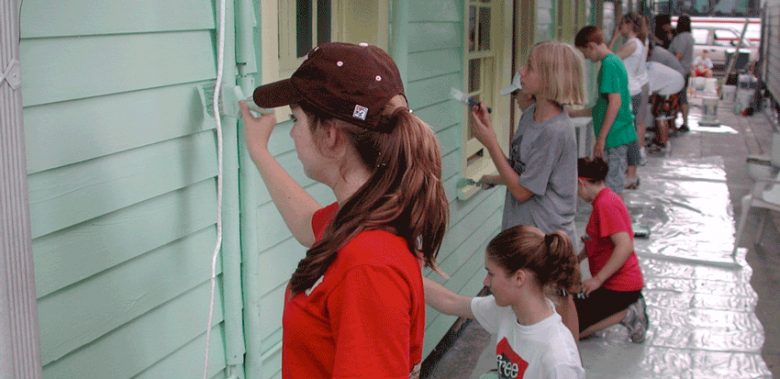Take the Time to Do the Prep Work
I am a project person. From brainstorming to execution to reveling in the completed product, I love projects, especially the home-improvement, crafty, organizational ones. I think what I love most, however, is how much I have learned through doing projects. I’m not talking about the technical stuff, either. What I’m talking about is wisdom.
About four months ago, I decided to refinish some old, tired looking patio furniture from IKEA.

Originally purchased eight years ago, the set fit the necessary criteria: it had a TABLE and CHAIRS that we could AFFORD, and it was STURDY (at least sturdier than the plastic stuff). Neither ugly nor attractive (nor comfortable), we never really enjoyed the set. And after we got nicer stuff, it was pushed to the margins of the yard, somewhat functional, but hardly used.
Refinishing the set was going to be a four-step process:
- Clean and Sand the Wood
- Prime with an oil-based paint
- Decoratively paint
- Finish with polyurethane
In all honesty, I don’t necessarily enjoy every part of every step in any given project. Specifically, I neither enjoy cleaning years of caked on dirt and spider webs nor do I like sanding. But if there’s one thing you cannot skip it’s the prep-work.
Taking the time to do the prep work always pays off in the long run.
In the case of this project, I begrudgingly admitted to my insistent husband that yes, I wanted to avoid frustration when it came time to paint the chairs, and yes, I wanted my efforts to be long-lasting, so yes, I would take the time to clean and sand the wood. Yes, I would properly prime everything with the smelly, difficult-to-clean oil based paint.

In reality, “taking the time to do the prep work” applies to practically every aspect of our lives. Take the “PIES” model of self-examination: Physical, Intellectual, Emotional, Spiritual.
- Physically, when we don’t properly warm up or train, slowly building up to the goal, we are more prone to hurt ourselves.
- Intellectually, when we don’t do the necessary reading or studying in preparation for a class or a meeting, the parties involved experience the frustration of wasted time, and the failure to perform can have ever-widening implications on our jobs, our reputation with others, and even in our personal integrity.
- Emotionally, taking the time to do the prep work can impact our ability to truly be in the present moment. Sometimes this is about coming to terms with where we are in the process of “change.” Other times, this is about working through “differences.” Acknowledging and attending to emotions helps us to be more present to one another in the situation at hand, rather than being fixated on the past or the future.
- Spiritually, taking the time to do the prep work is about cultivating ourselves as people of justice. Spiritual prep work is about developing the moral character to be good people who do the right thing. It’s about becoming a person who means it when they pray, “Thy will be done.” It’s about setting aside the time to be with God in prayer while reflecting on life. It’s about aligning our whole selves with the folks to whom Jesus says, “Come, inherit the kingdom…For I was hungry and you gave me food.” (Matthew 25:34-35).
“Plank preparation with sanding sponge © Depositphotos.com/simazoran”








